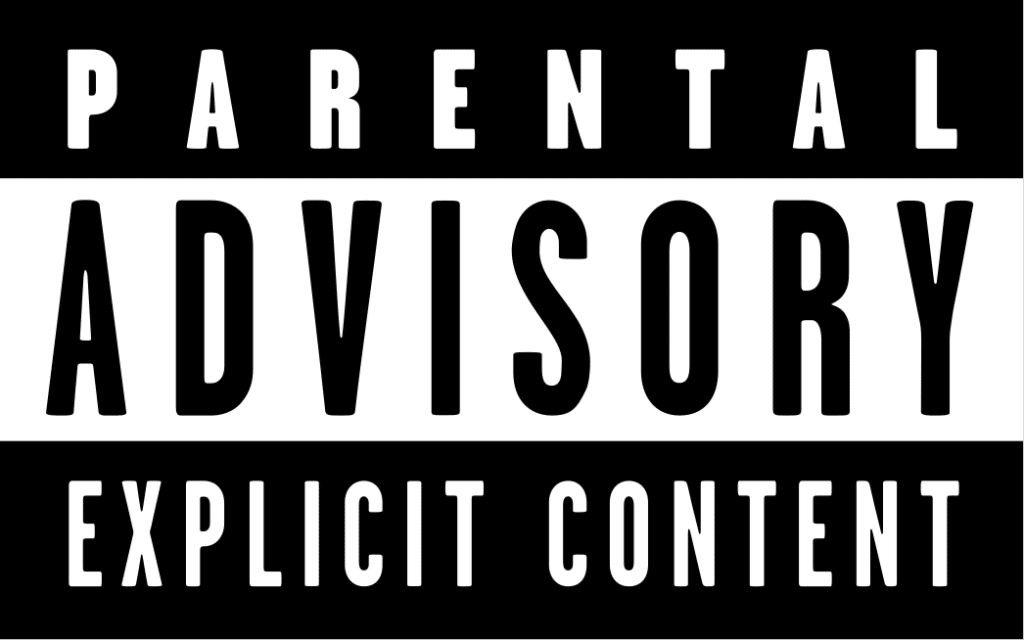If you’re an avid music streamer, you’ve probably seen a little “E” next to the title of a new song. Maybe you’ve come across an album you like, and a small black and white parental advisory label decorates the bottom right-hand corner of the cover.
Let’s talk about the purpose of these labels and what they mean for your children.

Explicit Content Meaning
Explicit content warnings like an “E” for “explicit” or the parental advisory logo serve to notify music listeners of content that may be inappropriate for kids. This content includes strong language or depictions of violence, sex, or substance abuse.
Why is the parental advisory warning used?
We have concerned parents to thank for the use of these content warnings. In 1984, the political group, Parents Music Resource Center (PMRC), was formed with the goal of protecting children from explicit lyrics so commonly found in hip hop and rap songs.
The PMRC vocalized their concern to powerful record labels within the music industry, and after months of lobbying, a US Senate hearing was held. Finally, in the 1990s, the advisory system was born, advising parents of potentially unsuitable content for children.
Albums with explicit content warnings were not sold in certain stores. Today, whether a store sells explicit music albums is up to their own discretion.

What Are the Rules of Explicit Content Warnings?
Although the explicit content label is used widely by many artists, it’s actually not required by law to label explicit music as such.
While it may not be legally required, many artists in the recording industry opt to include the parental advisory explicit content warning on their music. This is primarily to avoid controversy and to attract the right audience.
Recording companies will also opt to use the warning because their distributors require it for sale in their stores.
Even streaming services like Spotify that use an “E” to indicate explicit songs aren’t required to label their songs and leave that choice up to the artist’s discretion.
However, there is a rating system of sorts for explicit songs. If the artist decides that they’d like a label on their music, they first have to obtain the label from the Recording Industry Association of America (RIAA). The RIAA looks over the lyrics and then determines if they will label the song.
However, if an artist decides not to submit the song to the RIAA, there is nothing the RIAA or anyone else can do to stop the distribution of the song.

How Can Parents Protect Children From Explicit Music?
There are ways for parents to put explicit music restrictions on streaming apps like Apple Music, Spotify, Pandora, Google Devices, and Amazon Music.
If you’d rather not worry about toggling on parental controls, Gabb Music’s library is full of clean songs that have been meticulously monitored for explicit content. This way, you know that your kid won’t be able to listen to explicit music, labeled or not.
On streaming apps where explicit songs are streamed but not always labeled, there are ways to report such songs to the artist, however, it’s up to the artist whether they’ll label their music.
When it comes to proceeding in situations like this, where there are sometimes few fool-proof ways of protecting your children, conversation is always a good place to start.
Consider sitting down with your children to talk about the music they listen to and how it makes them feel. If you’ve found them listening to music that you’d rather they not listen to, it can be easy to want to confiscate the music with no further discussion.
However, kids will be more likely to follow rules when they know the “why” behind them. You could discuss with your child how music affects them, whether that be because the lyrics are violent and dehumanizing, or whether it contains swear words that you don’t want them exposed to. You can explain music etiquette and how good music can bring people together and increase happiness.
Then work together to find a solution. Maybe your child could delete the song that bothers you, or find a different song with the same sound and clean lyrics.
At the end of the day, you’re the parent and you know your child best. As children grow up, their taste in everything changes, even in music. You and your family will work together to find what works best as you navigate this technological world.









Success!
Your comment has been submitted for review! We will notify you when it has been approved and posted!
Thank you!